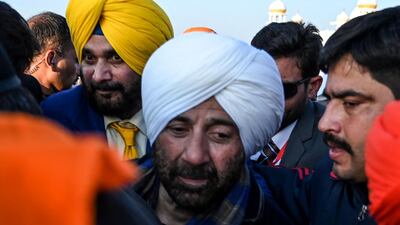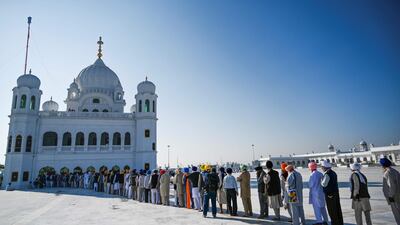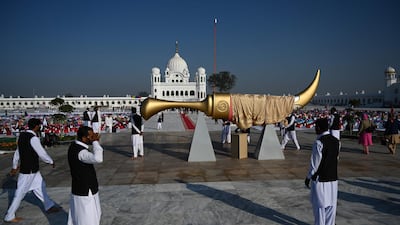Hundreds of Sikh pilgrims have streamed across the India-Pakistan border to take advantage of a landmark new visa-free corridor between the nuclear-armed neighbours.
The inauguration of the Kartarpur corridor on Saturday marked a rare moment of cooperation between two of the world's most implacable rivals, and even led to comparisons with the fall of the Berlin Wall.
Pakistan opened the secure corridor allowing visa free access to Gurdwara Darbar Sahib Kartarpur, the second holiest shrine in the Sikh faith, which is just four kilometres inside Pakistan. Visas are normally difficult to obtain.
Saturday's ceremony came as tensions between Islamabad and Delhi are still strained by India's decision to revoke self-rule in its portion of disputed Kashmir.
"When it comes to government-to-government relations, it is all hate and when it comes to people-to-people ties, it's all love," one of the Sikh pilgrims, who did not give his name, told Pakistani state TV as he crossed.
Among the first pilgrims to pass through the gate was former Indian Prime Minister Manmohan Singh, who told Pakistani state media that it was a "big moment".
"I hope relations between Pakistan and India will improve after opening of Kartarpur," he said.
The shrine to Sikhism's founder, Guru Nanak, was left inside Pakistan after the partition of British India in 1947, while most Sikhs were on the other side of the border. The neighbours have fought three wars since then and their almost constant animosity has made pilgrimages difficult. Many Sikhs have had to content themselves with a glimpse of the temple's domes through a telescope set up at the border.
The opening comes just days ahead of the Guru Nanak's 550th birthday on November 12, an anniversary of huge significance for the global Sikh community.
Speaking before the ceremony, Pakistan's foreign minister said the new crossing point had the potential to change the region.
“You saw the Berlin Wall go down, we all saw that, right?” said Shah Mahmood Qureshi. “It changed the face of Europe. Kartarpur can change the face of South Asia.”
Yet, he said that contacts between Islamabad and Delhi remained at “zero”, with no back channel between the rivals about how to solve their differences.
Imran Khan, Pakistan's prime minister, inaugurated the corridor, welcoming Sikhs from around the world.
"I am happy we could do this for you," he told the crowd. "Believe me, I had no idea of the importance this place holds; I found out a year ago.
He likened the inability of Sikhs to visit Kartarpur to Muslims only being able to see one of their holiest sites from a distance.
But he also used his speech to attack Delhi's policy in Indian-administered Kashmir, saying Kashmiris “are being kept like animals”.
“Their rights have been snatched away which the United Nations Security Council gave them. If Modi is listening, [he should know that] justice brings peace and injustice spreads confusion.”
Mr Modi had earlier thanked his opposite number as he addressed pilgrims as they set off for the border.
“I also thank Pakistan's Prime Minister Imran Khan for understanding India's wishes and turning Kartarpur into reality,” he said.
Mr Khan said after his 2018 election that he would attempt to rebuild ties with Delhi, vowing to take two steps forward for every step India made. Yet ties have if anything worsened and the countries came close to another war in February when a suicide bomber killed 40 Indian paramilitary police in Pulwama in India’s northern state of Jammu and Kashmir. India blames Pakistan for sponsoring militancy and terrorism in Kashmir and launched an air strike in reprisal.







